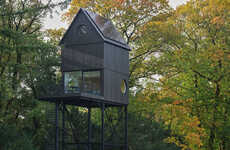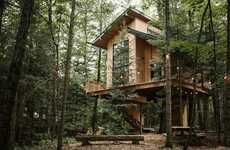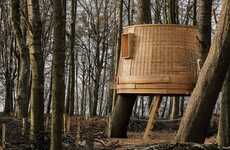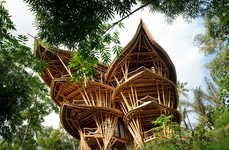
This Hip Japanese Hotel is Located in an Ancient Camphor Tree
Katherine Pendrill — July 28, 2015 — Eco
References: risonare-atami & designtaxi
Takashi Kobayashi recently collaborated with Hiroshi Nakamura of NAP Architects to build an elevated hotel in an ancient camphor tree. If you're looking for a unique hotel experience, this expansive treehouse abode may be the perfect place to stay.
The hip new treehouse hotel is part of the luxurious Risonare Atami Resort in Japan’s Shizouka Prefecture. The treehouse itself is built around an ancient camphor tree that is believed to be more than 300 years old. In order to protect the tree itself, the interlocking treehouse wraps around the trunk without ever touching the tree. To achieve this unique design, the architects had to built a steel trellis that would hold the structure, but still allow the tree to continue to grow.
The hip treehouse hotel is currently open for business, which means you could be spending a night nestled among the Japanese treetops.
The hip new treehouse hotel is part of the luxurious Risonare Atami Resort in Japan’s Shizouka Prefecture. The treehouse itself is built around an ancient camphor tree that is believed to be more than 300 years old. In order to protect the tree itself, the interlocking treehouse wraps around the trunk without ever touching the tree. To achieve this unique design, the architects had to built a steel trellis that would hold the structure, but still allow the tree to continue to grow.
The hip treehouse hotel is currently open for business, which means you could be spending a night nestled among the Japanese treetops.
Trend Themes
1. Elevated Treehouse Hotels - The trend of building treehouse hotels that interlock with ancient trees is becoming increasingly popular, attracting eco-tourists and nature lovers who prioritize sustainable tourism.
2. Innovative Treehouse Architecture - There is an opportunity for architects to showcase their creativity by designing treehouses that are not only structurally sound, but environmentally-friendly and awe-inspiring.
3. Luxury Eco-tourism - More resorts and hotels are shifting towards eco-tourism and sustainability as a way to provide unique, high-end experiences for travelers while being responsible stewards of nature.
Industry Implications
1. Hospitality - The hospitality industry could benefit from incorporating eco-tourism and innovative architecture to set their hotels and resorts apart from competitors while attracting environmentally-conscious travelers.
2. Architecture - There is an opportunity for architects to specialize in designing and building eco-friendly, structurally sound treehouses that seamlessly integrate with natural surroundings.
3. Travel - As travelers become more conscious of their impact on the environment, there is an opportunity for the travel industry to tap into responsible and sustainable tourism as a growing market.
5.4
Score
Popularity
Activity
Freshness























